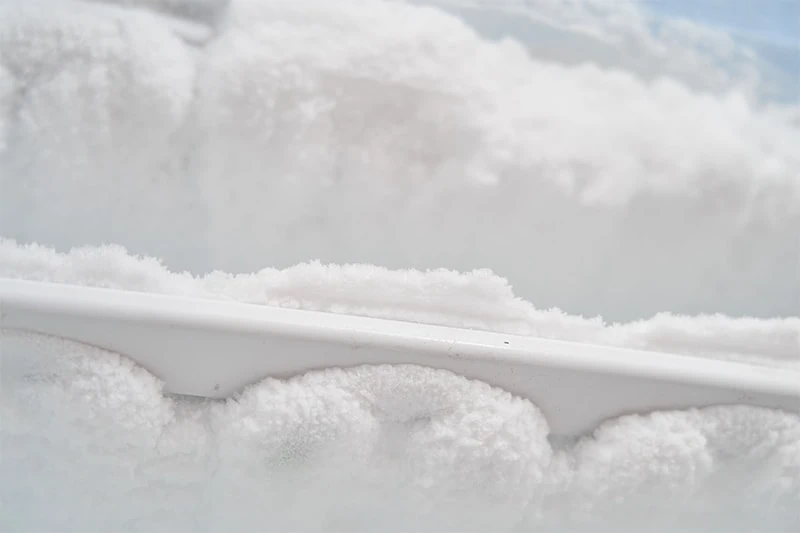
There are some simple things you can check to see why your fridge or freezer is not turning on. You may simply need to:
If the refrigerator is still not powering on, there may be a power supply issue at the outlet:
Keep in mind that you should never plug your fridge into an extension cord, as this can cause:
Most manufacturers will warn against using extension cords with their commercial refrigerators, and ignoring this warning may void your warranty.

Ice build up in your commercial refrigerator can cause:
Temperatures above safe levels and excess moisture can cause your freezer to overwork itself to compensate and maintain optimal temperatures.
The defrost cycle on your commercial refrigerator will remove any excess condensation and frost build up. You may need to adjust the defrost cycle if you notice any frost build up inside the unit. Set the cycle to defrost more regularly, and you should notice a reduction in frost build up. If there is no change however, then the defrost controller may need repair or replacement altogether.
To defrost your freezer, turn off the unit at the mains, and place a towel on the floor in front of the open door. Place a tray on top of the towel, and allow the ice to slowly melt out and into the tray. You can speed up the melting process by placing a bowl of hot water at the bottom of the appliance. Once the unit has defrosted, use a soft sponge to clean out the inside.
Note: Do not stab at the ice with a knife, screwdriver, or any other hard object. This is a great way to damage your refrigerator. Allow the ice to melt away on its own.
If you notice a buildup of ice throughout your fridge, there may be an issue with the evaporator fan.
To check if your evaporator fan is working correctly, turn off your appliance, and allow all the ice to melt away. Make sure the coils of the evaporator are clean. You can refer to the cleaning tips provided in your refrigerator’s manual. Turn the refrigerator back on, and if you notice that only part of the evaporator is getting icy, this may indicate a low charge. The unit’s sub-cooling and pressures should be checked, if not by you then by a service technician.
If drain lines are not properly cleared of dirt and food particles regularly, it could cause a water puddle to settle at the bottom of your appliance, and ice to build up.
If a blocked drain line stays blocked for too long, it can cause water to go back up through the line. This can also cause the whole unit to overheat. Make sure the drain line is in tact, and you can use warm water to flush the pipe, or clear it with compressed air.
A damaged door seal allows warm air and moisture to enter the refrigerator, causing condensation to form and ice up the inside walls. Make sure the door closes properly by cleaning door seals and replacing them if necessary. Also make sure there is nothing blocking the door from closing fully.
If you notice that a light in your refrigerator has stopped working, it needs to be replaced with a light bulb that is approved by the manufacturer of your unit. If you insert the wrong light bulb, it could cause the light sockets to burn out.
If your commercial refrigerator is on but doesn’t seem to be cooling, then you may have an issue with your temperature controls. The first thing you should check is the placement of your refrigerator. If it’s hard up against the wall, this will affect the unit’s ability to circulate air effectively.
As mentioned before, ice build up is a sign that warm air could be getting into your refrigerator, which can affect the temperature levels. Make sure the doors are all tightly sealed when shut.
If you see some irregularities in your temperature readings, you may have a faulty temperature gauge that needs replacing. Keep a spare thermometer handy so you can place it in the fridge and check yourself. This will show if the thermostat is working and the temperature gauge is giving an accurate reading.
Note that a blocked vent in your refrigerator can also affect the temperature reading.
Commercial refrigerators have a heavy duty compressor that cools the internal environment of your fridge to the ideal temperature. If the compressor gets dirty or overheats, it will affect its cooling ability. Compressors should be cleaned ideally every 3 months on average, as food debris, grease, and even hair can build up.
The best thing you can do for your commercial refrigerator is to maintain it. Cleaning each part of your appliance regularly will ensure its longevity, efficiency, and will allow you to spot issues before they get worse.
The more you use your equipment, the more parts get worn out. Repair or replace anything that has stopped working optimally, as this will affect the performance of your unit.
If you’re serious about looking after your commercial fridge, and don’t want to risk losing stock, schedule a regular time for a certified service technician to come and inspect your refrigerator.